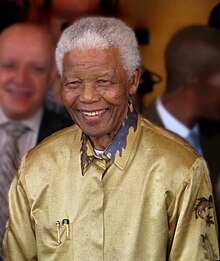4 May 1999 Pakistani Prime Minister Nawaz Sharif helps South African President Nelson Mandela towards his car in Islamabad.
Born: July 18, 1918, Mvezo, South Africa
Died: December 5, 2013, Houghton Estate, Johannesburg, South Africa
Spouse: Graça Machel (m. 1998–2013), Winnie Mandela (m. 1958–1996), Evelyn Mase (m. 1944–1958)
Education is the most powerful weapon which you can use to change the world.
I learned that courage was not the absence of fear, but the triumph over it. The brave man is not he who does not feel afraid, but he who conquers that fear.
It always seems impossible until it's done.
Nelson Rolihlahla Mandela (/mænˈdɛlə/;[1] 18 July 1918 – 5 December 2013) was a South African anti-apartheid revolutionary, politician, and philanthropist, who served as President of South Africa from 1994 to 1999. He was the country's first black head of state and the first elected in a fully representative democratic election. His governmentfocused on dismantling the legacy of apartheid by tackling institutionalised racism and fostering racial reconciliation. Ideologically an African nationalist and democratic socialist, he served as President of the African National Congress(ANC) party from 1991 to 1997.
A Xhosa, Mandela was born in Mvezo to the Thembu royal family. He studied law at the University of Fort Hare and theUniversity of the Witwatersrand before working as a lawyer in Johannesburg. There he became involved in anti-colonialand African nationalist politics, joining the ANC and co-founding its Youth League. After the Afrikaner minority government of the National Party established apartheid – a system of racial segregation that privileged whites – he was appointed President of the ANC's Transvaal branch, rising to prominence for his involvement in the 1952 anti-apartheidDefiance Campaign and the 1955 Congress of the People. He was repeatedly arrested for seditious activities and was one of the activists unsuccessfully prosecuted in the 1956 Treason Trial. Influenced by Marxism, he secretly joined theSouth African Communist Party (SACP). Although initially committed to non-violent protest, in association with the SACP he co-founded the militant Umkhonto we Sizwe in 1961 and lead a sabotage campaign against the government. In 1962, he was arrested for conspiring to overthrow the state, and sentenced to life imprisonment in the Rivonia Trial.
Mandela served 27 years in prison, initially on Robben Island, and later in Pollsmoor Prison and Victor Verster Prison. Amid international pressure and growing fear of a racial civil war, President F. W. de Klerk released him in 1990. Mandela and de Klerk negotiated an end to apartheid and organised the 1994 multiracial general election in which Mandela led the ANC to victory and became President. Leading a broad coalition government which promulgated anew constitution, Mandela emphasised reconciliation between the country's racial groups and created the Truth and Reconciliation Commission to investigate past human rights abuses. While retaining the former government's economic liberalism, his administration introduced measures to encourage land reform, combat poverty, and expand healthcare services. Internationally, he acted as mediator in the Pan Am Flight 103 bombing trial and served as Secretary-General of the Non-Aligned Movement from 1998 to 1999. He declined a second presidential term and in 1999 was succeeded by his deputy, Thabo Mbeki. Mandela became an elder statesman and focused on charitable work, combating poverty and HIV/AIDS through the Nelson Mandela Foundation.
Mandela was a controversial figure for much of his life. Although critics on the right denounced him as a communistterrorist and those on the radical left deemed him too eager to negotiate and reconcile with apartheid's supporters, he gained international acclaim for his activism. He received more than 250 honours, including the Nobel Peace Prize, the U.S. Presidential Medal of Freedom, and the Soviet Lenin Peace Prize. He is held in deep respect within South Africa, where he is often referred to by his Xhosa clan name, Madiba, or as Tata ("Father"), and described as the "Father of the Nation".
| His Excellency Nelson Mandela OMP OM AC CC OJ GCStJ QC GCIH BR | |
|---|---|

Mandela in Johannesburg, on 13 May 2008
| |
| 1st President of South Africa | |
| In office 10 May 1994 – 14 June 1999 | |
| Deputy | Thabo Mbeki F. W. de Klerk |
| Preceded by | F. W. de Klerk as State President |
| Succeeded by | Thabo Mbeki |
| Personal details | |
| Born | Rolihlahla Mandela 18 July 1918 Mvezo, Cape Province, Union of South Africa |
| Died | 5 December 2013 (aged 95) Johannesburg, Gauteng,South Africa |
| Cause of death | Respiratory tract infection |
| Resting place | Mandela Graveyard Qunu, Eastern Cape 31°48′21.8″S 28°36′52.7″E |
| Nationality | South African |
| Political party | African National Congress |
| Other political affiliations | South African Communist Party |
| Spouse(s) |
|
| Children |
|
| Parents | Nosekeni Fanny Gadla Henry Mphakanyiswa |
| Alma mater | |
| Occupation | |
| Religion | Methodist |
| Known for | Anti-Apartheid Movement |
| Awards |
|
| Notable work(s) | Long Walk to Freedom |
| Signature |  |
| Website | www |
| Nickname(s) | Madiba Tata Dalibunga |


No comments:
Post a Comment